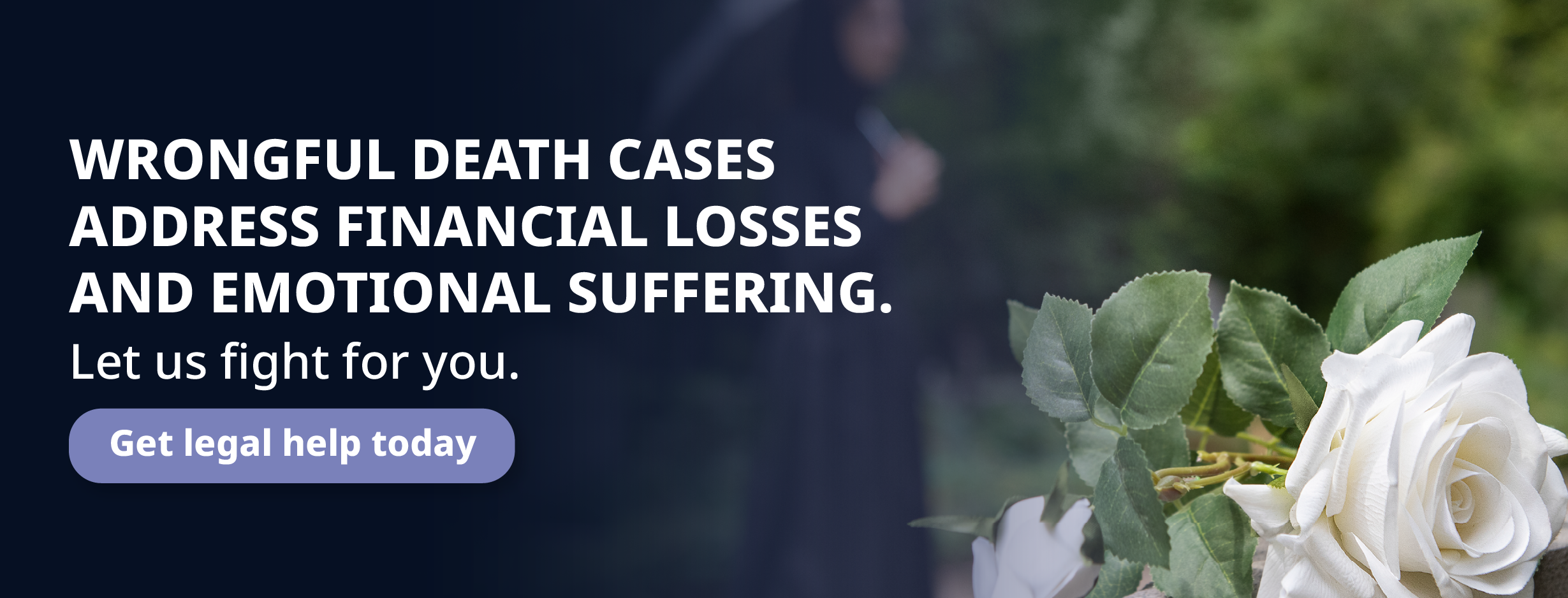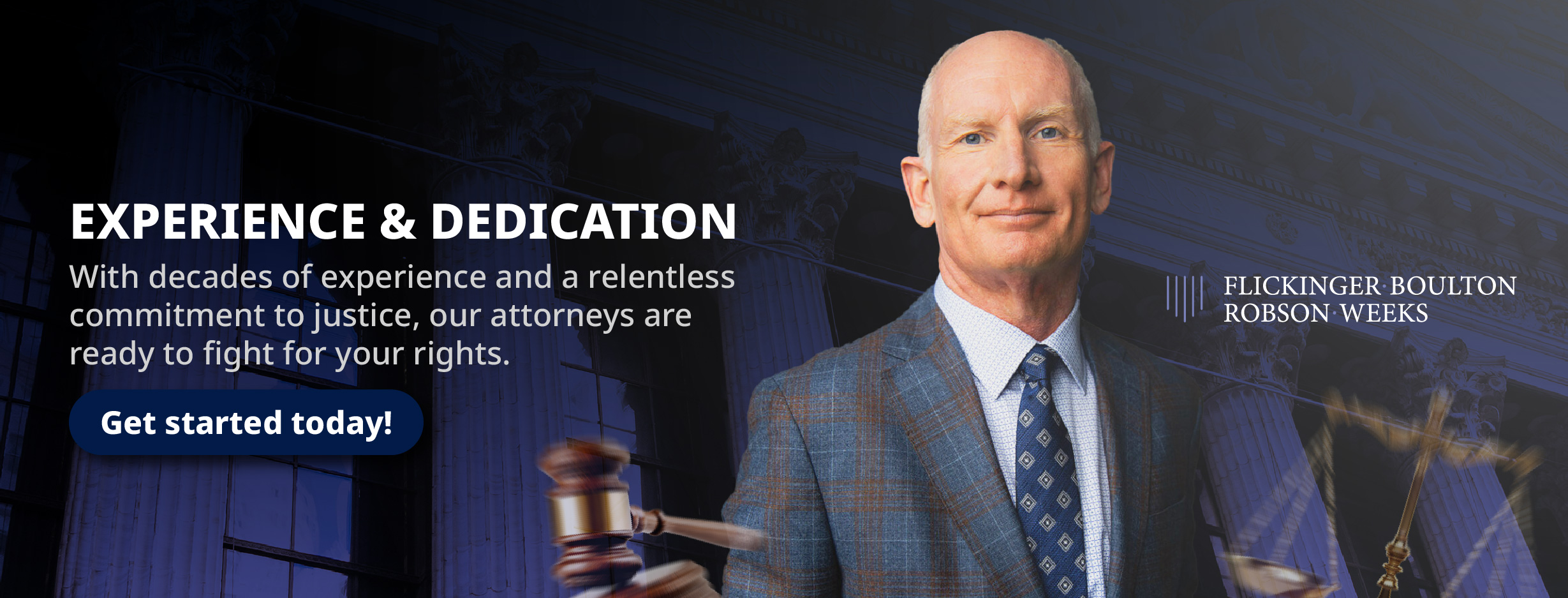¡Hablamos Español!
The loss of a loved one due to negligence or wrongful actions is a devastating experience, leaving families with grief, financial burdens, and legal uncertainties. If you are considering a wrongful death claim in Utah, understanding the legal process is essential to protecting your rights and ensuring that justice is served.
At Flickinger Boulton Robson Weeks, our experienced Utah wrongful death attorneys are here to guide you through every step of the legal journey. From filing the initial claim to negotiating with insurance companies and, if necessary, taking the case to court, we are committed to securing the compensation your family needs to move forward.
While no legal action can replace your loss, holding the responsible party accountable can provide a sense of closure and financial relief. Let us help you navigate this complex process with the compassion and dedication you deserve.

When a loved one’s death is caused by negligence, recklessness, or intentional wrongdoing, surviving family members may pursue justice through a wrongful death lawsuit. In Utah, this process involves several key legal steps, each designed to establish liability and secure compensation for the deceased’s heirs.
Understanding these steps can help families prepare for what to expect and ensure they take the necessary legal actions within the required timeframe.
Before filing a wrongful death lawsuit, it’s essential to determine who is legally eligible to file the claim. Under Utah Code § 78B-3-106, the following individuals may bring a wrongful death lawsuit:
If multiple family members wish to file a claim, they may work together or allow a court-appointed representative to handle the case on their behalf.
A wrongful death claim requires clear evidence of negligence or wrongdoing. This step involves:
This investigation is crucial in proving that another party’s negligence directly caused the death.
Once evidence is gathered, the lawsuit is formally filed in court. The plaintiff (family member or estate representative) submits a complaint outlining the following:
Utah law generally allows two years from the date of death to file a wrongful death claim, but claims against government entities must be filed within one year.
Most wrongful death cases begin with settlement negotiations before going to trial. The defendant’s insurance company may offer a settlement to avoid litigation. Our attorneys handle these negotiations by:
The case may end at this stage if a fair settlement is reached. However, if negotiations fail, the lawsuit proceeds to trial.
If the insurance company refuses to offer a just settlement, the case may go to trial, where a judge or jury will decide the outcome. Litigation involves:
While trials can take longer, they may result in a higher compensation award than an insurance settlement.
If a settlement is reached or the court rules in favor of the plaintiff, compensation is distributed among the eligible heirs. The final settlement or judgment may cover the following:
At Flickinger Boulton Robson Weeks, we are committed to guiding families through each stage of the wrongful death legal process. If you have lost a loved one due to negligence, contact us today to discuss your case.
A successful wrongful death lawsuit relies on strong, compelling evidence to prove negligence and establish the financial and emotional losses suffered by the surviving family members.
At Flickinger Boulton Robson Weeks, we understand that thorough investigation and documentation are critical in holding the responsible party accountable. Our legal team works diligently to collect, analyze, and present evidence that strengthens your case.
To prove liability and damages, we gather a wide range of evidence, including:
Police reports, accident reports, and autopsy findings provide crucial details about the cause of death.
Documentation of medical treatment before the victim’s passing can help establish a direct link between the negligent act and the fatal outcome.
Statements from individuals who saw the accident or wrongful act can provide firsthand accounts of what happened.
We consult accident reconstructionists, medical professionals, and financial experts to support our claims of negligence and the economic impact of the loss.
Video recordings, security camera footage, and accident scene photographs can serve as visual proof of what occurred.
Beyond proving negligence, we also gather evidence to demonstrate the financial and emotional losses suffered by surviving family members. This includes pay stubs to show lost income, testimony from family members about the loss of companionship, and expert evaluations of future financial losses.
By building a strong case based on solid evidence, we maximize the chances of securing fair compensation for our clients. If you’ve lost a loved one due to wrongful death, contact us today for a free consultation.
When pursuing a wrongful death claim, families must decide whether to accept a settlement or take the case to trial. Both options have advantages and challenges, and the best course of action depends on the specifics of the case, the strength of the evidence, and the willingness of the defendant or their insurance company to offer fair compensation.
At Flickinger Boulton Robson Weeks, we help clients navigate these decisions to achieve the best possible outcome for their case.

Most wrongful death claims are resolved through settlement negotiations rather than going to trial. A settlement occurs when the defendant (or their insurance company) agrees to pay a negotiated amount to the plaintiff in exchange for dismissing the case.
However, insurance companies often offer low settlements in an attempt to minimize their financial liability. Our Utah wrongful death lawyers negotiate aggressively to ensure families receive fair compensation that fully accounts for their losses.
If settlement negotiations fail or the defendant refuses to offer a fair amount, taking the case to trial may be the best option. A trial allows a judge or jury to decide the outcome based on the presented evidence.
While trials can result in larger compensation awards, they also come with risks, including longer timelines, higher costs, and unpredictable outcomes.
The decision to settle or go to trial depends on multiple factors, including the strength of evidence, the settlement offer, and the potential risks of litigation.
At Flickinger Boulton Robson Weeks, our team of experienced wrongful death attorneys carefully evaluate each case and provide guidance on whether a settlement or trial is the best path forward. If you’ve lost a loved one due to wrongful death, contact us today to discuss your options.
The length of a wrongful death lawsuit in Utah varies based on several factors, including the complexity of the case, the willingness of the defendant to settle, and whether the case goes to trial.
While some cases can be resolved in a matter of months, others may take several years before reaching a final resolution.
At Flickinger Boulton Robson Weeks, we work efficiently to resolve wrongful death cases while ensuring families receive the maximum compensation they deserve. Contact us today for a consultation.